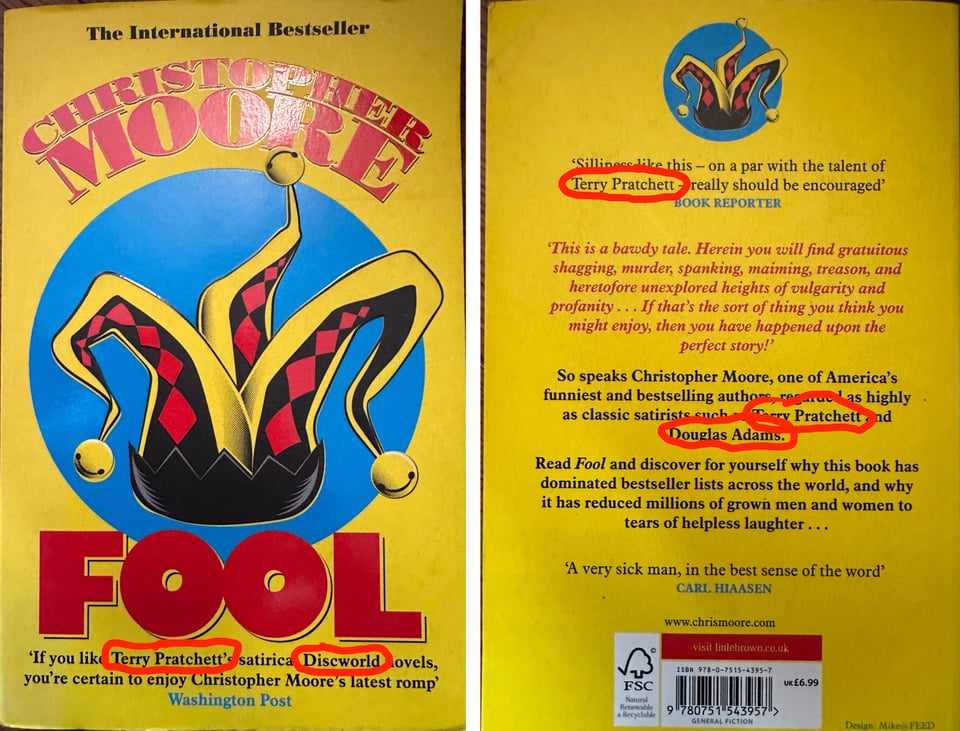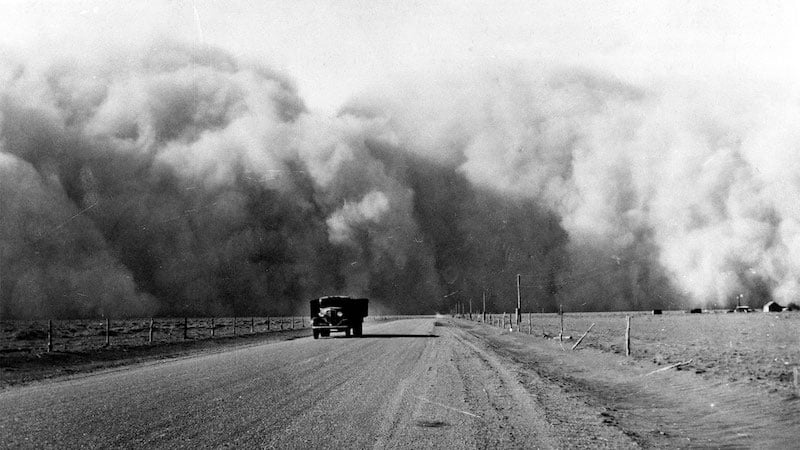Who Killed Humour SF/F? Why The Genre of Douglas Adams and Terry Pratchett is Now Dead
A decade or so ago, I attended an Eastercon event where a panel of writers, agents, and publishers advised would-be-writers on the subject of how to get conventionally published. I was just such a would-be-writer, albeit one who'd self-published, and I very much wanted to get conventionally published.
When the conversation got onto submitting a novel to an agent, it was said that your cover letter shouldn't compare your work to those of an overly-famous writer, and that under no circumstances should you ever compare yourself to Douglas Adams or Terry Pratchett.
In the subsequent Q&A, I got to ask a question: I explained that in all the reviews of my self-published novels, the only two names that people ever (favourably) compared them to were Douglas Adams and Terry Pratchett, so what should I do?
I'm only exaggerating slightly for comedic effect when I say that the response from the agent on the panel was along the lines of, "Oh my God, I'm so sorry, but if reviews compare your books to Douglas Adams and Terry Pratchett then you'll never get published."
Now don't get me wrong. I'm neither angry at what he said nor claiming he was in any way wrong. I've done all the stages: "They're wrong, humour SF/F isn't dead!"; "Why do these morons have a problem with humour SF/F?"; "Maybe I could leave some of the jokes out?"; "I'm never going to get published"; and "Okay, I'll just write stories, and if some humour happens to live within them, then fine, but I won't write jokes".
But it is curious that the genre popularised by two of the most beloved and best-selling British authors of the latter half of the 20th century is now regarded as deader than a Norwegian Blue nailed to its perch.
Why? How?
As you can imagine, I spent a considerable amount of time thinking about this during the several years it took me to work through the various stages of the Kübler-Ross model, and I did come up with various theories.
Now, firstly, there's the obvious and frequently raised point, which is that humour is subjective, culturally related, and faceted according to the personalities involved - or to put it another way, what you find funny might not be funny to someone else. Except that, if that were the beginning and end of the story, then Adams and Pratchett would never have become so successful, right?
So whilst there are considerable elements of truth in the above, there must be more to it than that.
Now we all know that if one book becomes a huge success, it will create its own genre and spawn a myriad of not-quite-so-good copies. One Christmas, "Why Don't Penguins' Feet Freeze?" became a huge best-seller; the next Christmas you couldn't move for titles like, "How Do Dogs Pick Their Noses?"
You saw it also when Dan Brown's Da Vinci Code created a sub-genre of Christian secret history. I once found two such books on the exact same theme (the Templars) on opposite shelves in the same Oxfam bookshop (I blogged about it, but sadly the pictures in the post are now lost).
The problem is, that not-with-standing what I said above, humour is difficult. A badly written mystery / adventure story can still nonetheless be highly readable (and there are many who would argue that the Da Vinci Code is a badly written book that turned out to be highly readable). But a joke that doesn't land is just painful.
When I was still working my way towards acceptance, I asked on social media for recommendations for humour SF/F books I might like, if I was a Terry Pratchett or Douglas Adams fan. (To be clear, I wasn't actually looking for books to read, but authors I could compare myself to in a cover letter). I got a few replies, but the most memorable one was something like, "Avoid like the plague anything that compares itself to Terry Pratchett".
Now I ended up picking up a book, Fool, by Christopher Moore, an author who's had a pretty distinguished career, and who I'm honestly not trying to say anything bad about. I'm going to talk about cover design and marketing here, and conventionally published authors famously have little to no say over that.
But here's the cover, marked up by me.

As you can see, Terry Pratchett's mentioned three times, the Discworld's mentioned once, and Douglas Adams gets a bonus mention. But here's the thing. I read the book, and whilst a perfectly good work, it's not at all like a Discworld novel.
Fool retells the plot of Shakespeare's play King Lear, but from the perspective of the character of the Fool, Pocket. So it has much more in common with Tom Stoppard's Rosencrantz and Guildenstern Are Dead than it does with any Discworld book. It's not really fantasy, with the only possibly fantastical element being when the Fool thinks he's seen a ghost.
If I'd bought this expecting it to be similar to the Discworld books, I'd have been very disappointed.
Now continuing with this theme, if you were a book buyer in the 1990s, you very likely come across the works of Craig Shaw Gardner.

Now if you think those covers are very similar in style to the original Josh Kirby covers for the Discworld books, well I believe they actually were drawn by Josh Kirby. Now I should say that I've never read these books. They might be brilliant. But they were very clearly marketed as being "Terry Pratchett-like", to the extent of hiring his cover artist.
So I think what happened is this. Following the success of the Discworld novels and the The Hitchhiker's Guide to the Galaxy in the 1980s, 1990s publishers jumped on what they saw as easy money, pushing books in the humour SF/F genre that were either not very good, or were being horribly mis-marketed (sufficiently so that people would learn to actively avoid any book that gratuitously mentioned Terry Pratchett).
Essentially, publishers did to the genre what the dustbowl did to Oklahoma in the 1930s. They so overexploited what they saw as an inexhaustible resource that they destroyed the entire genre.

What's the lesson I've taken from this? Well, right now, an SF/F author has to tell stories, with characters. Humour can come out, but only if it flows naturally from that story and those characters, as humour does in real life.
Think of UK TV. The soap Coronation Street is famous for including humour, reflecting the way that working-class people often use humour to cope with the difficulties in their lives.
But it's not a sit-com.
That's how it is with the novel that my agent currently has out on submission. There's humour in it, but it's a serious novel.
I've pretty much reached acceptance, now. But there is a little bit of me that still thinks it's a shame that humour, at least when it comes to SF/F, is bereft of life, has passed on, and having kicked the bucket has ceased to be. I can't quite accept that the genre I dreamed of writing in is pushing up daisies whilst singing in the choir invisible, alongside medieval romance and the western.
It is an ex-genre.
But then again, maybe it's not actually dead? Maybe it's just sleeping while pining for Slartibartfast's fjords.
I'm allowed a little hope, right?